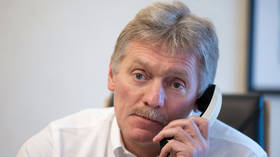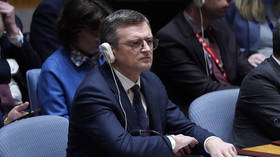Kremlin comments on Pope’s Ukraine plan

Comments by Pope Francis about launching peace talks to end the Ukraine conflict echo the repeated calls Moscow has made for the same, Kremlin spokesman Dmitry Peskov said on Monday.
Peskov’s remark comes after the head of the Catholic Church stated in an interview with Swiss broadcaster RSI over the weekend that it would be a display of courage from Kiev if it raised a “white flag” and entered into peace negotiations with Russia.
“The idea that [the Pope] spoke about is quite understandable,” Peskov said. “You know that [Russian President Vladimir Putin] has repeatedly spoken about our readiness and openness to solve our problems through negotiations and this is the preferred way.”
The spokesman noted, however, that the Pope’s calls, as well as those from other countries, including Russia, “have recently been met with an absolutely harsh rejection by the Kiev regime.”
In a statement on Sunday, Ukrainian President Vladimir Zelensky, without specifically mentioning Pope Francis, stated that the religious figures trying to help Ukraine are “together with the people, not two and a half thousand kilometers away somewhere, virtually mediating between someone who wants to live and someone who wants to destroy you.”
Foreign Minister Dmitry Kuleba, meanwhile, responded to the pontiff’s claims about the need to be able to accept defeat and “show courage and negotiate” by insisting that a strong person always “stands on the side of good” and stressing that Ukraine’s flag is the only one by which the country “lives, dies and will prevail.”
“We shall never raise any other flags,” Kuleba declared.
Several of Kiev’s foreign backers have also slammed the Pope’s statement, with Latvian President Edgars Rinkevics writing on X (formerly Twitter) that “one must not capitulate in face of evil” and must make sure that “the evil raises the white flag and capitulates.” Polish Foreign Minister Radoslaw Sikorski suggested that the Pope should be “encouraging Putin to have the courage to withdraw his army from Ukraine.”
Even after talks between Moscow and Kiev broke down in the spring of 2022, Russia has repeatedly stressed that it remains open to meaningful peace negotiations and has blamed the lack of diplomatic breakthroughs on the Ukrainian authorities.
Kiev and its Western backers, however, have insisted that an agreement can only be reached on Ukraine’s terms and have been promoting the so-called peace formula proposed by Zelensky, which calls for the non-negotiable return of all former Ukrainian territories, as well as the withdrawal of all Russian troops without preconditions, and an international tribunal for Russian leaders.













